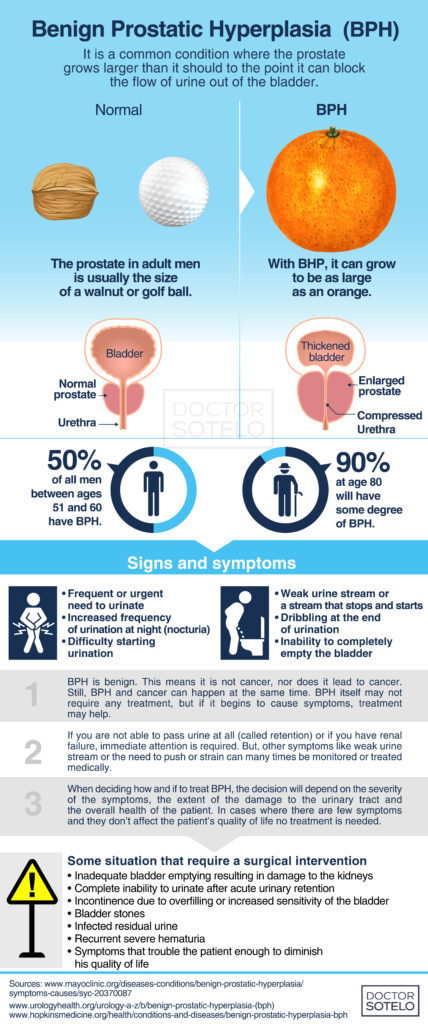Benign prostatic hyperplasia (BPH) is a common condition where your prostate grows larger than it should to the point it can block the flow of urine out of the bladder.
While the prostate is usually the size of a walnut or golf ball in adult men, it can grow to be as large as an orange. About half of all men between ages 51 and 60 have BPH and at 80 years old up to 90% of men will have some degree of BPH.
The severity of symptoms in people who have prostate gland enlargement varies, but symptoms tend to gradually worsen over time. Common signs and symptoms of BPH include:
• Frequent or urgent need to urinate
• Increased frequency of urination at night (nocturia)
• Difficulty starting urination
• Weak urine stream or a stream that stops and starts
• Dribbling at the end of urination
• Inability to completely empty the bladder
BPH is benign. This means it is not cancer, nor does it lead to cancer. Still, BPH and cancer can happen at the same time. BPH itself may not require any treatment, but if it begins to cause symptoms, treatment may help.
If you are not able to pass urine at all (called retention) or if you have renal failure, immediate attention is required. But, other symptoms like weak urine stream or the need to push or straincan many times be monitored or treated medically.
When deciding how and if to treat BPH, the decision will depend on the severity of the symptoms, the extent of the damage to the urinary tract and the overall health of the patient.
In cases where there are few symptoms and they don’t affect the patient’s quality of life no treatment is needed. Some situation that require a surgical innervation are:
• Inadequate bladder emptying resulting in damage to the kidneys
• Complete inability to urinate after acute urinary retention
• Incontinence due to overfilling or increased sensitivity of the bladder
• Bladder stones
• Infected residual urine
• Recurrent severe hematuria
• Symptoms that trouble the patient enough to diminish his quality of life
Reference:
1.https://www.mayoclinic.org/diseases-conditions/benign-prostatic-hyperplasia/symptoms-causes/syc20370087#:~:text=Benign%20prostatic%20hyperplasia%20(BPH)%20%E2%80%94,urinary%20tract%20or%20kidney%20problems.
2.https://www.urologyhealth.org/urology-a-z/b/benign-prostatic-hyperplasia-(bph)
3.https://www.hopkinsmedicine.org/health/conditions-and-diseases/benign-prostatic-hyperplasia-bph
